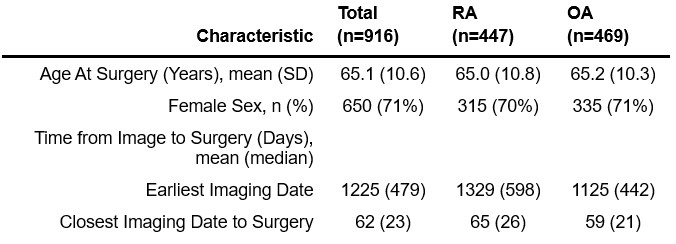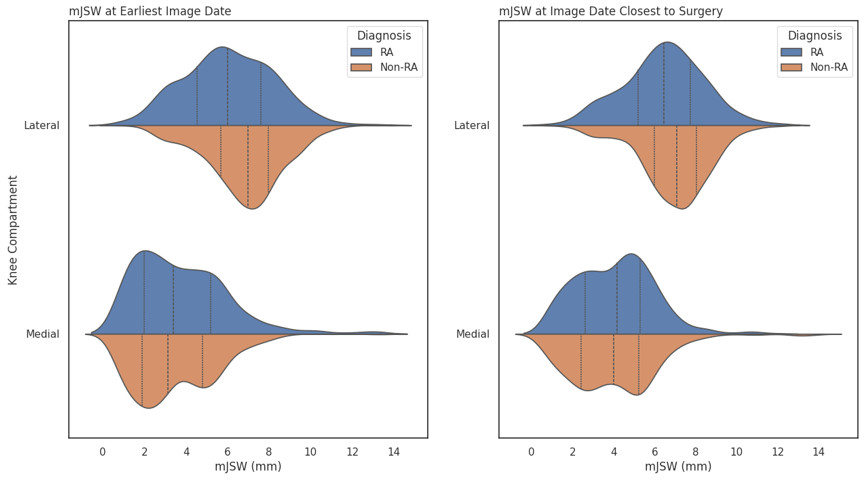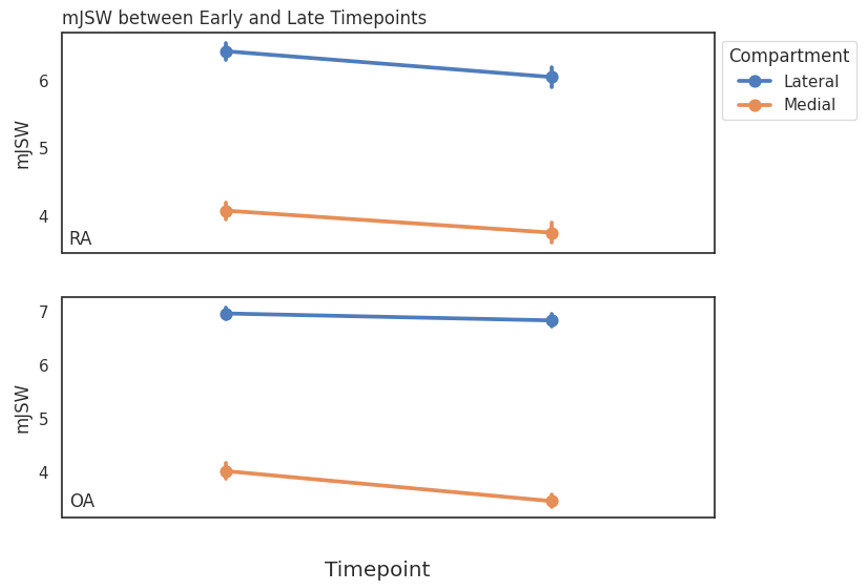Session Information
Session Type: Poster Session C
Session Time: 10:30AM-12:30PM
Background/Purpose: While large joint damage is a hallmark of both Osteoarthritis (OA) and Rheumatoid Arthritis (RA), the mechanisms of degradation are substantially different. Minimum joint space width (mJSW) in the knee joint is often used as a continuous variable proxy of disease progression, especially advanced cases necessitating total knee arthroplasty (TKA) planning. In this study, we sought to examine differences in mJSW between patients with OA and RA. We hypothesized that patients with RA would exhibit more symmetric mJSW between the lateral and medial compartments of the knee.
Methods: Data: In this single-center retrospective analysis, we identified patients who underwent TKA from 2000-2020. We collected imaging, demographic, and clinical data for each patient. As OA patients significantly outnumber RA patients, we paired each RA patient to an OA patient randomly sampled from patients matched by sex and age at surgery. For each patient, AP knee radiographs at two imaging dates were retrieved: 1) the earliest AP knee image and 2) the closest imaging date before TKA.
mJSW Calculator: The automated mJSW calculator is made of two components: 1) a deep learning segmentation model which contours bony structures on AP knee images and 2) a computer vision algorithm which uses the contours from the segmentation model to calculate mJSW. We defined mJSW as the shortest distance between each femoral condyle and the tibial plateau. 550 weightbearing AP knee radiographs not included in any subsequent analysis were segmented by two annotators and used to train the segmentation model, and performance of the end-to-end algorithm was validated in an additional 300 images where mJSW was measured independently by two annotators. The average difference in mJSW measurements between the algorithms and humans was 0.85mm, with 92% of differences falling below 2mm. In comparison, the average difference between the two humans was 0.75mm.
Statistical Analysis: Population means were compared using two-sided T-tests. P-values less than 0.05 were considered to be statistically significant.
Results: In total, 916 patients (447 with RA and 469 with OA) were included in the analysis. Patient characteristics are listed in Table 1. RA patients exhibited decreased lateral compartment mJSW compared to OA patients at the early (6.43mm vs. 6.95mm, p< < 0.001) and late (6.05mm vs. 6.83mm, p< < 0.001) timepoints (Figure 1). In the medial compartment, there was no difference between RA and OA patients’ mJSW at the early timepoint (4.08mm vs. 4.01mm, p=0.499), while at the image closest to surgery we found that RA patients have increased mJSW compared to OA patients (3.75mm vs. 3.45mm, p=0.002). RA patients experienced roughly uniform declines in mJSW between the early and late timepoints in both compartments, while decreases in mJSW for OA patients between the timepoints occurred mainly in the medial compartment (Figure 2).
Conclusion: Patients with RA experience more uniform cartilage degradation than patients with OA, where degeneration occurs eccentrically according to the overall alignment of the knee joint. Future work in this area could examine the relationship between RA disease state, medical management, and radiographic disease biomarkers.
To cite this abstract in AMA style:
Mulford K, Kaji E, Grove A, Sebro R, Wyles C, Davis J, Crowson C. Comparison of Knee Minimum Joint Space Width Measurements Using Deep Learning in Patients with Rheumatoid Arthritis and Osteoarthritis Undergoing Total Knee Arthroplasty [abstract]. Arthritis Rheumatol. 2024; 76 (suppl 9). https://acrabstracts.org/abstract/comparison-of-knee-minimum-joint-space-width-measurements-using-deep-learning-in-patients-with-rheumatoid-arthritis-and-osteoarthritis-undergoing-total-knee-arthroplasty/. Accessed .« Back to ACR Convergence 2024
ACR Meeting Abstracts - https://acrabstracts.org/abstract/comparison-of-knee-minimum-joint-space-width-measurements-using-deep-learning-in-patients-with-rheumatoid-arthritis-and-osteoarthritis-undergoing-total-knee-arthroplasty/



